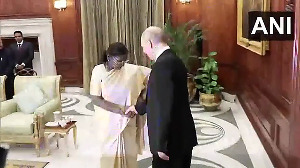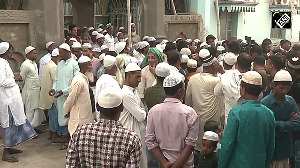EPS' acceptance of Amit Shah's proposal for an electoral alliance with the BJP is being interpreted to mean how the AIADMK has signed up the NDA national leader as a junior partner.
Not many have appreciated EPS for this strategic move that has now forced the BJP to play second fiddle to the AIADMK.
This has meant that the BJP has buried its ambitions of capturing power in Tamil Nadu now, and is willing to wait until after the 2029 Lok Sabha polls, observes N Sathiya Moorthy.

In yet another uncontested elections to the Rajya Sabha from Tamil Nadu, the ruling Dravida Munnetra Kazhagam and the Opposition All India Anna DMK have divided the available six seats 4-2, leaving aspirant allies with li'l option but to nurse their wounds.
Of course, the DMK's four include actor-politician Kamal Haasan, who was promised one for his Makkal Needhi Maiam backing the alliance in last year's Lok Sabha elections.
Given their strength in the assembly, the alliances led by the DMK and the AIADMK could have won as many seats, provided the allies did not protest.
DMK's Chief Minister M K Stalin did some quick thinking and announced his four candidates on day one, leaving little room for speculation and pressure-building.
According to reports, Stalin did not undertake any consultations with his senior party colleagues, or consult the allies.
The former would have injected fresh hope into the old guard. As senior ministers, whether in office or sacked already, they have been in the news for all the wrong reasons.
Stalin obviously wanted to avoid consulting them in the long run-up to next year's assembly polls.
Stalin had also briefed allies informally weeks earlier about the DMK's position in the matter.
Of them, MDMK's Vaiko, on retirement now,was miffed at not being given another consecutive term, but he could not, and hence did not protest.
As DMK sources pointed out, Vaiko was allowed to continue his Rajya Sabha membership when the alliance allocated the Tiruchi Lok Sabha constituency to his son Durai Vaiko, and also ensured his victory last year.
After Vaiko's murmurs, the son said they were not exactly happy with the DMK's decision but there was no question of making an issue out of it.
Needless to point out that every partner in either alliance, including the MDMK, did not want to upset the apple-cart just now, with the hope of obtaining a better deal during seat-sharing talks next year.
This includes aspirants from the state Congress, but the Stalin leadership seems to have informed the party high command in advance and the reasons thereof.
Of greater significance is the way Stalin announced his four names early on, leaving the other two for the AIADMK rival.
With the numbers it has in the assembly, the AIADMK could have won one seat comfortably, but would have required the support of the five-member PMK and four-member BJP, to win the sixth seat.
There was early speculation that the DMK might field a fifth candidate, to make it difficult for the AIADMK to win a second seat.
This would have involved the DMK having to engineer cross-voting, possibly from the AIADMK and/or PMK, as the four BJP legislators are not expected to drift away.
From a DMK perspective, such a course would have forced the allies to rally round the AIADMK, and ensure relatively smooth victory for the sixth seat.
The Stalin leadership did not want that to happen, nor did it want to compromise the chief minister's 'Mr Clean' image -- rather his image as a decent politician.

Yet, there was no denying the pressure that AIADMK boss Edappadi K Palaniswami (EPS) faced, especially from allies.
The late actor-politician Vijayakanth's DMDK expected a Rajya Sabha seat for current party boss Premalatha Vijayakanth.
Early on, however, the AIADMK leadership clarified that there was no truth in media claims that the DMDK was promised a Rajya Sabha seat ahead of the assembly elections next year.
The AIADMK could take a tough stand vis-a-vis the DMDK, as the party's vote-share has slid down below one per cent.
In the preceding weeks and months, Premalatha was seen as wooing the DMK, again with the same purpose in mind -- but the latter was not swayed, either.
However, it would have been difficult for EPS to deny a seat for PMK President Dr Anbumani Ramadoss if he had pressed his case for a second consecutive term.
Thankfully for the AIADMK, the filial fight for supremacy in the PMK, involving Anbumani and his father Dr S Ramadoss, the party founder, led to a piquant situation that gave EPS a breather in particular.
After all, in ordinary circumstances the PMK with a proven five per cent vote-share over three decades, would not be trifled with.
Today, however, even if the family feud ends amicably, there is apprehension that traditional supporters would have moved away from the PMK.
The party might not be able to attract first-time voters, especially from the traditional Vanniar community base.
Interestingly, the BJP, which has four crucial MLAs and was rumoured to be expecting a Rajya Sabha seat for immediate past state party president K Annamalai, did not seem to have pressed the case.
Opinion is divided if it meant that the national leadership did not want to promote Annamalai or if it did not want to embarrass EPS more than already.
Apart from the projected perception that the AIADMK was 'afraid' of the BJP, there was also the lack of mutual support between EPS and Annamalai, when the latter was the state party chief.

All of it has meant that the two Dravidian majors have pulled a fast one on their allies, national or regional, one more time, without providing them with elbow room to manoeuvre.
Almost from the early years of the vertical split in the parent DMK in 1972, the two Dravidian majors have 'conspired silently' without mutual consultations of any kind, to ensure that they rule the roost on either side of the electoral divide, election after election, decade after decade.
It's unlike what once used to be at the national level, where the Congress and the BJP used to have backroom operatives 'fix' or stall toppling games in states ruled by each other.
In Tamil Nadu, there used to be a time after the death of AIADMK founder M G Ramachandran (MGR), when the Congress party actually came back into the electoral game, by scoring a 20 per cent vote-share in the assembly polls of 1989, but gave up even that minimum advantage for the future, on the altar of the Lok Sabha polls later in the year.
The Congress struck a deal with the AIADMK factions that reunited under Jayalalithaa, later-day chief minister.
Thus, whatever be the outcome of the assembly polls next year, or how the two alliance leaders conduct seat-sharing talks with their respective partners, the tactical upswing that the Big Two engineer at every other opportunity seems to keep them in good stead.
Thus, EPS' ready acceptance of Amit Shah's proposal for an electoral alliance with the BJP so early in the day is also being interpreted to mean how the AIADMK has signed up the NDA national leader as a junior partner.
Not many have appreciated EPS for this strategic move that has now forced the BJP to play second fiddle to the AIADMK.
This has to be contextualised to the BJP's national/notional claims that the party-led alliance had polled a respectable 18.5 per cent vote-share in the Lok Sabha elections last year, and was thus very much in the race for chief minister's job in 2026.
At least the likes of Annamalai and BJP-sympathetic sections of the national media had come up with such projections.
Leave aside the fact that junior allies actually accounted for identifiable shares in the BJP-NDA's polling figure, there was always the fear that another Third Front idea, if followed up in the assembly elections, could cut both ways.
Like with the rival Congress predecessor at the national-level, the BJP leadership is also more focussed on the next Lok Sabha elections in 2029.
This requires that the anti-Hindutva, hence anti-BJP, DMK-led alliance cannot continue to dominate Tamil Nadu's electoral politics.
If there is a split in the anti-DMK votes one more time, not only would the AIADMK face a drubbing more severe than last year's.
The BJP, which has not been able to muster an absolute majority in the Lok Sabha last year, too, cannot hope for compensating prospective losses, too, through non-traditional regions like Tamil Nadu.

In arriving at such calculations, the BJP strategists seem to still rely on the old school thinking that in Dravidian Tamil Nadu, the winner continues to take most, if not all the Lok Sabha seats.
The Modi era Lok Sabha elections of 2014, 2019 and 2024 in the state have remained proof of the same.
This has meant that the BJP has buried its ambitions of capturing power in the state just now, and is willing to wait until after the 2029 Lok Sabha polls, if that is what it needs.
That now leaves the DMK and the AIADMK to keep the state between themselves, what with the Congress rival of the BJP and ally of the DMK not being in any position whatsoever to raise its head, as it did in 2011, and lost the state for the ruling DMK-led UPA-II.
At the end of the Rajya Sabha polls, Stalin has emerged as a strong leader within the DMK, stronger than he already was.
He has proved to be as smart a strategist as his late father M Karunanidhi was -- though not as much in political administration, it would seem.
On the other side, EPS too has come out of it all unscathed.
By refusing the DMDK's demand for now, and promising to grant them one seat in the Rajya Sabha elections that might overlap with the assembly polls in April next, he has sought to ensure that the ally from last year's LS poll did not paint him as untrustworthy.
N Sathiya Moorthy, veteran journalist and author, is a Chennai-based policy analyst and political commentator.
Feature Presentation: Aslam Hunani/Rediff










